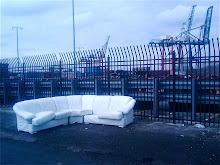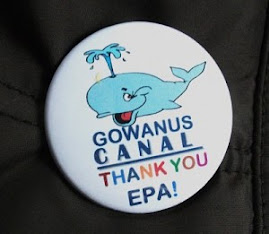 Photo by Joshua Kristal (edited), South Brooklyn Post
Photo by Joshua Kristal (edited), South Brooklyn PostAs I noted in the updates to my previous post, the City's Committee on Waterfronts has postponed its hearing on the resolution (here) urging the Public Service Commission to establish a new rate of electricity that would allow the use of shore power for the ships visiting the Brooklyn Cruise Terminal in Red Hook. The new date for the hearing is tentatively set for 1pm., March 8th, at the same location - 250 Broadway, 16th Floor. Open to the public.
While we're waiting - yet again - for further action to be taken on this long awaited plan, I think it's helpful to reflect on a couple of pieces of news that are pertinent to this issue.
I'm pleased to see that the "South Brooklyn Post" is continuing to do a great job of covering the story of the stalled process that is holding up the implementation of the shore power plan in Red Hook. After covering the story of cruise ship pollution when the rest of the city's media was AWOL, and after covering the protest that was held in January that urged the breaking of the impasse that was holding this plan up, this week they did a follow up to their initial story, which was published in November, that went into further detail about the conflict. The most recent article, "Big Money Ignores Brooklyn Air" by Lisa M. Collins, basically asks this question: If Carnival are doing so well right now - making huge profits ($11.3 Billion over the last 5 years, $2 Billion in 2010) while paying very little in tax (1.1%, in fact) - why is it such an imposition to ask them to pay a little more, a tiny percentage of their Queen Mary 2 sized profits, to pay for the ongoing costs of using clean, green-house gas reducing electricity while in port, instead of idling their engines and using the dirtiest form of diesel on the planet, the burning of which spews carcinogenic and asthma inducing substances into our city's air, and into our kids' lungs?
This article clearly puts at least some of the onus for the resolution of the shore power stalemate on the shoulders of the cruise operators, Carnival.
And it's only fair.
You know, for the most part, in my writing on this blog, I've tried not to demonize the cruise ships, their operators and billionaire owners. In full disclosure, I've worked on cruise ships in the past as a musician, I've taken a cruise with my family, I've enjoyed the cruising experience on the whole and haven't had any particular animosity towards them. When the cruise terminal opened at the end of my young family's residential street, I, like most of my neighbors, wasn't against it. We all thought it could bring a little more vitality to our waterfront and our neighborhood. However, after that "vitality" never materialized, greatly due to the expedient and shoddy planning of the terminal and its site (without shore power), and since finding out more about the harmful emissions from the visiting ships and generally about the cruise industry and their practices - particularly their patchy environmental record - I've obviously become more ambivalent about it.
Still, the reality is that recently many of the cruise ship operators have been trying to clean up their environmental act - at least a little. (See Friends of the Earth's 2010 "Cruise Report Card" here). For example, some have been reducing or eliminating practices like the disposal of rubbish and waste (including sewerage) at sea. To their credit, Carnival and others are converting some of their ships to accept shore power, as is the case with a number of the Carnival ships that are based on the West Coast, so that they can eliminate the practice of idling in port. Unfortunately, none of the cruise lines, as far as I can see, are volunteering to switch to the use of cleaner low-sulfur fuel while out at sea, but the ships that cruise in the continental waters of the US and Canada will ultimately be required to burn cleaner fuel in those waters, due to the future implementation of the North American Emissions Control Area.
I get it. They're a business. They're just trying to make money, and according to the City of New York, the cruise industry is bringing money to the city and benefiting us all.
But, really, in an environment where the cruise operators are doing so well, and where there is clearly the ability on their part to pay a fair portion of the cost of using shore power, why are Carnival being so recalcitrant?
How well are Carnival doing? Well, apart from the facts about their profits (and miniscule taxes) that are noted above and in this NY Times article (here), there is this recent article in USA Today (here) that notes this staggering, record-breaking information -
Carnival Cruise Lines said it set a one-week reservations record, booking 165,308 customers between Feb. 7-13, eclipsing its previous one-week reservations record set nearly four years ago.The line said bookings were at "unprecedented levels" across its fleet.
It's good times for Carnival. But, while many of the parties involved in this deal to "plug in" the cruise ships at Brooklyn seem to be making some concessions to "get it done", Carnival hardly seems to be coming to the party.
The New York City Economic Development Corporation, the City agency that built the new cruise terminal and brought the polluting ships to our neighborhood, has been trying to strike a deal with the New York Power Authority to subsidize the rate of electricity supplied to the ships to make the practice more economically viable. The Port Authority has allocated $12 Million for the building of the shore power infrastructure. The EPA, through its Diesel Emissions Reduction (DERA) program, has granted nearly $3 Million for the same. (Side note: Worryingly, for proponents of cleaner ports and those wanting to reduce the health burden of port pollution on our most vulnerable, DERA was given no mention in the recently released US budget proposal). Our legislators are pushing for an end to the "idling ships and idling negotiations", as they said at the recent protest, and with the NY City Council Shore Power resolution, they are urging the Public Service Commission to establish a new "shore power tariff" to allow the cruise ships, in the long term, to "plug in" without economic disincentive.
A lot is being offered.
So far, Carnival's only commitment has been to retrofit their ships to accept shore power, at a cost of $1 - 2 Million per ship. That sounds like a decent offer on the surface, but aren't Carnival getting off pretty easily? They've already done many of these conversions on their other ships, and isn't it likely that they'd have to do this with them all anyway because many ports, including some on the West Coast, are making it mandatory to for cruise ships to plug in while in port. Also, as I've mentioned before, there is the coming regulation that would force ships of all types to use cleaner, more expensive diesel in US waters, so the cost differential for using shore power will eventually be far less - a further incentive for its broad use. Additionally, as our cities and nation as a whole tries to reduce CO2 and other greenhouse gasses, and with the EPA playing a role in regulating these emissions, (despite push-back in the Republican House), the use of shore power will, no doubt, be an obvious and effective method being encouraged to reduce these significant emissions from all types of ships while in port, while reducing our reliance on fossil fuels.
My point is, given these factors, and with all of this news about Carnival and the cruise industry as a whole doing so well, why shouldn't we expect them to do their bit to get this shore power deal done - soon?
It's troubling enough to know that Carnival, like many cruise lines, is using every loophole they can to minimize their taxes and reduce their operating costs - like being registered in Panama, or not having to comply with US labor laws - while benefiting greatly from the tax payer-funded services and infrastructure of the cities they visit, like New York. It's hard enough to hear Carnival cry "poor" and unable to pay for shore power when they're operating luxury cruise ships like the Queen Mary 2 and doing business at a record breaking, "unprecedented" pace - in a recession!
While they're getting away with all of that, isn't it at least fair to ask them to give back a little to the communities that they call their neighbors?
What's at stake here isn't just Carnival's bottom line. It's the health of the residents of the communities in which they operate. As I wrote in one of my previous posts, when I criticized the callousness of the way Con Edison and the Public Service Commission were weighing up the "cost" and "fairness" of establishing a shore power rate, this isn't just about money.
You can certainly count the costs of the extra pollution that the ships are bringing in monetary terms. The Port Authority did this in their recent testimony to the Public Service Commission, stating that the avoidable cruise ship pollution was costing Brooklyn residents an estimated $9 Million per year in monetized health costs.
But it's not just about the money.
It's about the boy on our block, a friend of my 7 year old son, who is suffering from increasingly regular bouts of asthma, often ending in a visit to the emergency room.
It's about the three kids in the Red Hook Houses that died from asthma attacks just last year.
It's about the two women on our block, and more in our community, who have recently developed cancers.
It's about the 40% childhood asthma rate, and cancer clusters that occur in our neighborhoods.
Can Carnival - and the others who are dragging their feet - tell these people that the ship emissions are playing no role in these negative health outcomes? Can Carnival tell our residents that they are doing their business and earning their massive profits at no cost to their neighbors - our community, our residents, particularly our most vulnerable?
At a time when there's a lot of talk about shared sacrifice, I think it's clear that our community has done its fair share. We've been bearing the burden of the many hundreds of tons of new pollution that has been emanating from the ships since they started calling Red Hook home in 2006, all in the name of "economic development".
Now it's time for those, like Carnival, who are benefiting from this economic development and are doing very well, to do their bit to make sure our residents don't have to carry this cost any more - in their health or otherwise.
It's Carnival's turn - even if it means taking a small hit to their ever-growing profits.
.



